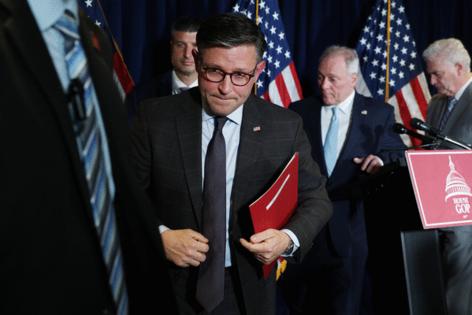Government funding and more nominations headline this week in Congress
Published in Political News
WASHINGTON — This week the House aims to pass a stopgap funding bill designed to avoid a government shutdown at least into November, ahead of next week’s recess for Rosh Hashana.
There are only two scheduled session days for Congress the following week, with the fiscal year ending on Sept. 30, a day ahead of Yom Kippur. So there’s ample incentive to try to get as much done as possible before the end of the current week.
Speaker Mike Johnson, R-La., when asked Sunday about whether either Russia sanctions or an extension of health care tax credits would ride along with government funding, suggested that discussions on those items might not be feasible before the end of the month.
“You’ve got to build consensus around all of it, but I think we’ll need a short-term funding measure — a clean CR — that will allow more time to figure all this out. We certainly hope that Democrats will go along on that, because if not, they really have no excuse,” Johnson said on CBS’s “Face the Nation.”
House and Senate Democrats have been pressing for the Republican majorities to address the expiring health care premium tax subsidies.
“[The Republican] megabill and other policies are an assault on the health care system that is driving health care costs higher and kicking people off their coverage,” Democratic Congressional Campaign Committee Chair Suzan DelBene of Washington said at an event Friday. “Congress must act immediately to prevent millions of families across the country from losing their Exchange coverage by extending the subsidies. We have to prioritize policies that help address the needs of working families, not the wealthy and well-connected.”
In an additional wrinkle, GOP leaders over the weekend were mulling additional funding to increase security for lawmakers in the wake of the assassination of conservative political activist Charlie Kirk. The White House made a late request to add $58 million in emergency funding to increase security for executive and judicial branch officials, while leaving Congress to decide whether or how much extra funding is needed for its own security, sources said Sunday.
Johnson said he had been speaking with members and “trying to calm the nerves, to assure them that we will, we will make certain that everyone has a level of security that’s necessary, that the resources will be there for their residential security and their personal security.”
As that’s playing out, the House’s to-do list also includes legislation related to crime in Washington, D.C., and federal oversight of the city. The House this week is expected to take up a bill designed to eliminate the current D.C. judicial nominations commission and give the president full say in the process of nominating local judges.
“We cannot allow an unaccountable, left-leaning commission to restrict the Constitutional power of the President to limit appointees to soft-on-crime and biased judges that better align with their political agenda,” the office of House Majority Leader Steve Scalise, R-La., said in announcing the week’s schedule.
There’s also a bill on the House floor agenda that would reduce, to 14 years, the age at which minors can be tried as adults for committing certain serious felonies in D.C.
Senate could confirm many nominations
Senate Republicans are continuing to work through the process of confirming a tranche Trump nominees after having advanced a resolution with a simple majority vote that allows en bloc consideration, and there will be more to follow as soon as this week.
The Senate Foreign Relations Committee is due to meet Wednesday morning to advance at least 32 nominees — including some previously reported and returned to the committee for procedural reasons — setting up another potential en bloc package for floor consideration following the new process.
The headliner on the Foreign Relations Committee schedule is former Rep. Mike Waltz, R-Fla., who served as national security adviser early in the current Trump administration and who is now the president’s nominee to be U.S. ambassador to the United Nations.
One nominee who is on track to be confirmed separately ahead of the en bloc packages is Stephen Miran, nominated to be a member of the Board of Governors of the Federal Reserve System. Republicans want Miran to take his seat before this week’s Fed meetings, with an interest rate announcement expected on Wednesday.
The fiscal 2026 defense authorization bill is also still outstanding on the Senate floor, but it was not immediately clear whether there would be a catch-all agreement on amendments that would allow the Senate to invoke cloture and reach a vote on final passage before the time crunch created by the government funding deadline and the planned recess.
------------
—David Lerman contributed to this report.
©2025 CQ-Roll Call, Inc., All Rights Reserved. Visit cqrollcall.com. Distributed by Tribune Content Agency, LLC.
























































Comments